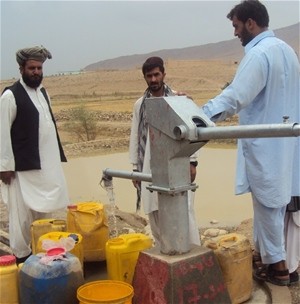
Al-Temor community members collect clean drinking water from a well recently constructed by USAID.
USAID/SWSS
USAID-funded wells are providing water to 4,000 people in Logar Province.
5 NOVEMBER 2010 | AL TEMOR, LOGAR PROVINCE, AFGHANISTAN
Despite the lack of safe drinking water, thousands of families live in and around crowded Puli Alam located in Logar Province. In particular, Al-Temor Village had no nearby wells or potable water sources, causing a great deal of hardship for residents because they had to collect water from unclean sources far from their homes. The burden of water collection often fell on children, which negatively affected their health and decreased the amount of time they could devote to schoolwork and other pursuits.
To improve access to clean water, the USAID funded Afghan Sustainable Water Supply and Sanitation (SWSS) project recently constructed 30 new bore wells in and around Al-Temor.
Prior to the well construction, unclean drinking water caused many waterborne diseases in children less than five years of age. Following an assessment in the Al-Temor area, the SWSS project started to drill new wells to provide clean water and reduce the water-related health issues suffered by local residents. The newly constructed wells now provide safe clean drinking water for approximately 4,000 people.
Haji Ahmad Khan, head of the Al-Temor Community Development Council, thanked USAID for its great service to the community. “Potable water was one of the basic needs of our community and that need is now being fulfilled with the newly constructed wells,” he said. Ahmad Khan also encouraged USAID to construct more wells throughout Puli Alam District.
The SWSS project is currently working on the construction of more than 200 wells in various communities throughout Logar Province to bring clean water and decrease disease risk to an increasing number of people in eastern Afghanistan.
SWSS increases access to potable water supply and sanitation services in poor communities, decreases the prevalence of water related diseases through household hygiene interventions, and improves the sustainable management of potable water quality and quantity in project-assisted communities.







Comment
Make a general inquiry or suggest an improvement.